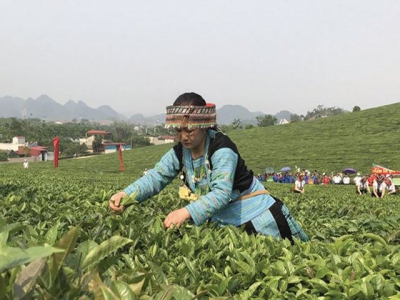Tea producers lose big money because of weak cooperation

The lack of materials for processing and the unhealthy competition among tea producers are the consequence of the uncontrolled increase in the number of tea processing workshops.
Tea producers lose VND1 trillion a year because of weak cooperation
Nguyen Duy Chanh, director of Moc Chau Tea, said there are about 10 preliminary processing workshops in Moc Chau area, but not all of them have material growing areas.
Moc Chau Tea cooperates with farmers to develop material growing areas, committing to buy all the material output from farmers. However, it sometimes loses materials to the mini workshops which pay more for materials.
Nguyen Thi Anh Hong, secretary general of the Vietnam Tea Association (Vitas), said there is unhealthy competition among tea producers.
According to Hong, the material areas are limited and cannot be expanded.
A Vietnamese owned tea processing plant located in an ancient tea area, for example, now has to compete with a new plant established as a Vietnamese business. But it is Chinese owned in reality.
The lack of materials for processing and the unhealthy competition among tea producers are the consequence of the uncontrolled increase in the number of tea processing workshops.
The plant offers very high prices to farmers.
“If Vietnamese plants offer the price of VND20,000 per kilogram, Chinese pay VND30,000. As a result, Vietnamese plants fail to collect materials for processing,” she explained.
Meanwhile, the current laws stipulate strict requirements on material areas.
According to Nguyen Hong Son from the Ministry of Agriculture and Rural Development (MARD), the institutions and businesses that process and trade tea, must develop material areas of their own, or sign contracts with farmers on collecting materials.
The processing workshops must be equipped with modern production lines and technologies which ensure food safety.
However, the regulations have been ignored.
According to Vitas, Vietnam has 130,000 hectares of tea area. It is the fifth largest tea exporter in the world with 500 processing workshops. However, Vietnam’s tea export price is just equal to 60-70 percent of the world price.
Every year, Vietnam’s tea industry loses VND1 trillion because of weak cooperation in production organization.
Hong said tea exports have been going very slowly in recent months, which is blamed on the sharp appreciation of the dollar against the local currencies of import countries.
As of mid-August, Vietnam had exported $110 million worth of tea products, a decrease of 7.3 percent compared with the same period last year.
It is estimated that 80 percent of tea exports bear VAT. The problem is that tea exporters can get VAT refunds only 30 months later, so they lack working capital to maintain production.
Related news
 Fruit and vegetable exports expected to hit US$4 billion
Fruit and vegetable exports expected to hit US$4 billion Vietnam's fruit and vegetable exports are on course to exceed US$4 billion in 2018, with a strong annual growth rate of more than 14%.
 Seminar discusses measures to boost exports of farm, fisheries products to Japan
Seminar discusses measures to boost exports of farm, fisheries products to Japan Vietnamese companies, especially those in the Cửu Long (Mekong) Delta, should participate in trade promotion programmes if they want to expand exports to Japan
 Rice export business: Just loosening but not 'untying'?
Rice export business: Just loosening but not 'untying'? Traders may export rice if: Have at least one specialized storehouse for storing paddy and rice in conformity with national standards and technical regulations